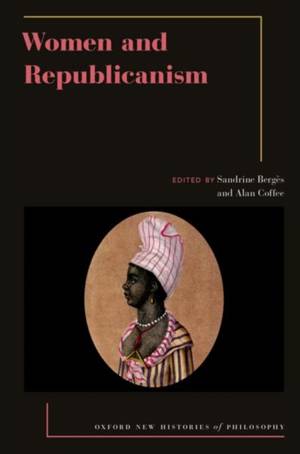
Bedankt voor het vertrouwen het afgelopen jaar! Om jou te bedanken bieden we GRATIS verzending (in België) aan op alles gedurende de hele maand januari.
- Afhalen na 1 uur in een winkel met voorraad
- In januari gratis thuislevering in België
- Ruim aanbod met 7 miljoen producten
Bedankt voor het vertrouwen het afgelopen jaar! Om jou te bedanken bieden we GRATIS verzending (in België) aan op alles gedurende de hele maand januari.
- Afhalen na 1 uur in een winkel met voorraad
- In januari gratis thuislevering in België
- Ruim aanbod met 7 miljoen producten
Zoeken
Women and Republicanism
€ 123,95
+ 247 punten
Omschrijving
The history of republican philosophy has long been regarded as an exclusively male endeavour. In recent years, scholars have highlighted and restored the undeniable republican contributions of a select group of women. Bergès and Coffee here collect ten essays that examine the important philosophical contributions made by women to the history of republican political thought. The contributors reveal the depth and richness of women's political thought within the republican paradigm. They highlight the history of women's exclusion in republican discourse, not only as citizens and thinkers but even within the masculine-coded language and ideas embedded in its key terms, such as virtue, that have been transmitted across generations. Alongside chapters on figures whose republican contribution has been well attested, such as Mary Wollstonecraft and Catharine Macaulay, the volume also highlights the work of lesser known republican scholars, including by French (Louise de Keralio, Germaine de Staël), Italian (Rosa Califronia), Brazilian (Nísia Floresta), Turkish (Halide Edip, Nezihe Muhiddin) and African American women (Maria Stewart, Harriet Jacobs, Anna Julia Cooper). Women in Republicanism broadens the conversation about republican history from its Anglo and North American core to embrace a more global understanding, particularly in the context of emancipatory struggle.
Specificaties
Betrokkenen
- Uitgeverij:
Inhoud
- Aantal bladzijden:
- 272
- Taal:
- Engels
- Reeks:
Eigenschappen
- Productcode (EAN):
- 9780197753248
- Verschijningsdatum:
- 4/03/2026
- Uitvoering:
- Hardcover
- Formaat:
- Genaaid
- Afmetingen:
- 156 mm x 235 mm

Alleen bij Standaard Boekhandel
+ 247 punten op je klantenkaart van Standaard Boekhandel
Beoordelingen
We publiceren alleen reviews die voldoen aan de voorwaarden voor reviews. Bekijk onze voorwaarden voor reviews.








